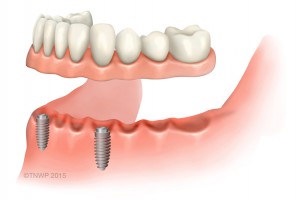Can dental implants secure my denture?
 If you are missing all your teeth, you may already have a conventional full denture. Dentures can be uncomfortable to wear for extended periods of time; suction, adhesive and the muscles in your tongue and cheeks help to hold them in place. The mouth and gums can become tired, and the denture may rock and move. Poor-fitting dentures are prone to slipping, which can make the gum line sore and cause you to mumble or slur your words.
If you are missing all your teeth, you may already have a conventional full denture. Dentures can be uncomfortable to wear for extended periods of time; suction, adhesive and the muscles in your tongue and cheeks help to hold them in place. The mouth and gums can become tired, and the denture may rock and move. Poor-fitting dentures are prone to slipping, which can make the gum line sore and cause you to mumble or slur your words.
Dental implants can provide a cost-effective answer to these problems. A tooth implant acts as a replacement for your missing tooth root. Usually made from titanium, it is placed into the jaw underneath the gum and left to fuse with the jawbone, using a process known as osseointegration. This produces a secure bond between the implant and the surrounding bone.
Reducing movement and pressure
Implant-retained dentures, sometimes called overdentures, rest on the gum but have two or more implants with locator abutments to hold them in place. They are removeable and function like a conventional denture, but without horizontal movement. Pressure is spread between the implants and the gums.
The attachments work in a similar way to press stud fasteners on clothes. They lock into the inside of the denture and can be adjusted for more or less retention and allow you to remove it at least twice daily for cleaning. Just as with normal dentures, you should, ideally, not sleep with them in your mouth. They can be stored overnight in a denture cleanser solution or water. Patients can sometimes have their existing denture adapted, but usually a new one is needed.
Implant-retained removeable dentures are just one option available to you with tooth implants. Get in touch with a local implant dentist to find out what type of dental implant treatment is right for you.
